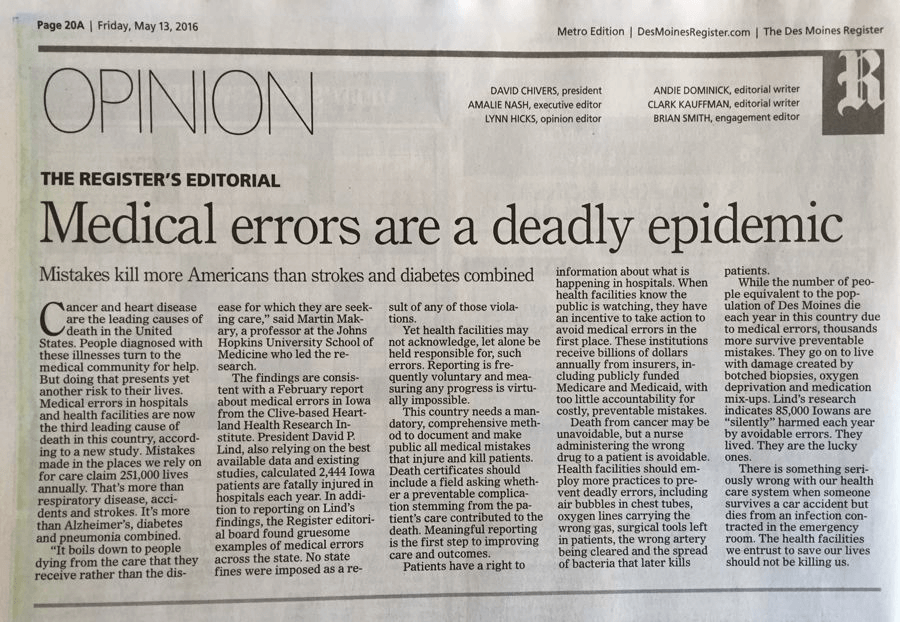James Practices In:
Personal InjuryProducts LiabilityMedical MalpracticeWrongful Death
Although Jamie is an Iowa native, he spent his first 11 years of practice in San Diego, California. He moved his family back to Iowa in 1998 and joined JSC Legal. Jamie's general practice includes but is not limited to medical malpractice, personal injury and product liability work on behalf of plaintiffs. These types of work make use of his educational background in the biomedical sciences.
Jamie is an active member of the American Association for Justice and the Iowa Association for Justice. He also serves on the Board of Permanent Planning, Inc., a non-profit organization devoted to providing guardians for disabled individuals, and the Board of Trustees of the Greater Waverly Municipal Band.

Editorial: Medical errors are a deadly epidemic
Cancer and heart disease are the leading causes of death in the United States. People diagnosed with these illnesses turn to the medical community for help. But doing that presents yet another risk to their lives. Medical errors in hospitals and health facilities are now the third leading cause of death in this country, according to a new study. Mistakes made in the places we rely on for care claim 251,000 lives annually. That’s more than respiratory disease, accidents and strokes. It’s more than Alzheimer’s, diabetes and pneumonia combined.
“It boils down to people dying from the care that they receive rather than the disease for which they are seeking care,” said Martin Makary, a professor at the Johns Hopkins University School of Medicine who led the research.
The findings are consistent with a February report about medical errors in Iowa from the Clive-based Heartland Health Research Institute. President David P. Lind, also relying on the best available data and existing studies, calculated 2,444 Iowa patients are fatally injured in hospitals each year. In addition to reporting on Lind's findings, the Register editorial board found gruesome examples of medical errors across the state. No state fines were imposed as a result of any of those violations.
Yet health facilities may not acknowledge, let alone be held responsible for, such errors. Reporting is frequently voluntary and measuring any progress is virtually impossible.
This country needs a mandatory, comprehensive method to document and make public all medical mistakes that injure and kill patients. Death certificates should include a field asking whether a preventable complication stemming from the patient’s care contributed to the death. Meaningful reporting is the first step to improving care and outcomes.
Patients have a right to information about what is happening in hospitals. When health facilities know the public is watching, they have an incentive to take action to avoid medical errors in the first place. These institutions receive billions of dollars annually from insurers, including publicly funded Medicare and Medicaid, with too little accountability for costly, preventable mistakes.
Death from cancer may be unavoidable, but a nurse administering the wrong drug to a patient is avoidable. Health facilities should employ more practices to prevent deadly errors, including air bubbles in chest tubes, oxygen lines carrying the wrong gas, surgical tools left in patients, the wrong artery being cleared and the spread of bacteria that later kills patients.
While the number of people equivalent to the population of Des Moines die each year in this country due to medical errors, thousands more survive preventable mistakes. They go on to live with damage created by botched biopsies, oxygen deprivation and medication mix-ups. Lind’s research indicates 85,000 Iowans are "silently" harmed each year by avoidable errors. They lived. They are the lucky ones.
There is something seriously wrong with our healthcare system when someone survives a car accident but dies from an infection contracted in the emergency room. The health facilities we entrust to save our lives should not be killing us.